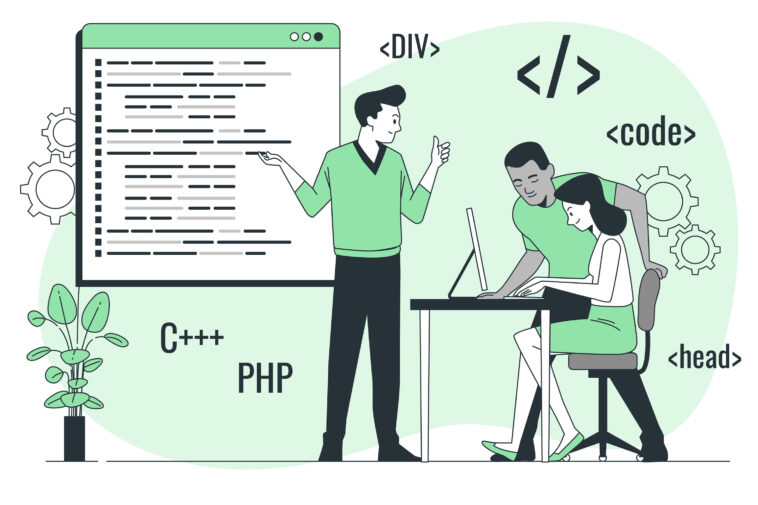PHP, a robust and versatile scripting language, powers a substantial portion of the web. When it comes to develophp frameworksping web applications using PHP, choosing the right framework is crucial. PHP frameworks offer structures and tools that streamline development, enhance security, and maintain code scalability. With a myriad of options available, selecting the best PHP framework tailored to your project’s needs can be daunting. Let’s explore some of the top contenders in the PHP framework landscape to help you find your perfect match.
The Best PHP Frameworks:
1. Laravel:
Known for its elegant syntax and expressive code, Laravel has gained immense popularity within the PHP community. Offering a rich set of features including authentication, routing, and caching, Laravel simplifies complex tasks and accelerates development. Its robust ORM (Object-Relational mapping) called Eloquent facilitates database management, making it an ideal choice for projects of varying complexities.
2. Symfony:
Renowned for its modularity and extensibility, Symfony provides reusable components that enable developers to create scalable and high-performance applications. It offers a wide range of tools and libraries, empowering developers to build custom solutions tailored to specific project requirements. Symfony’s flexibility makes it suitable for both small and enterprise-level applications.
3. CodeIgniter:
Emphasizing simplicity and ease of use, CodeIgniter is a lightweight PHP framework that excels in rapid application development. It boasts a small footprint, making it ideal for projects where efficiency and performance are critical. CodeIgniter’s straightforward configuration and minimalistic approach attract developers seeking a hassle-free framework.
4. Zend Framework:
Recognized for its enterprise-level capabilities, Zend Framework provides a collection of professional-grade PHP packages. It offers a highly customizable architecture, facilitating the development of robust and secure applications. Although it requires a learning curve, its flexibility and comprehensive feature set make it a preferred choice for complex projects.
5. CakePHP:
Favored for its convention-over-configuration approach, CakePHP emphasizes rapid development by reducing boilerplate code. Its scaffolding feature enables the automatic generation of basic code, expediting the initial phase of development. CakePHP’s built-in validation, caching, and security features make it suitable for building scalable applications.
Points to Evaluate When Selecting a PHP Framework:
- Project Requirements: Assess the specific needs of your project, including scalability, complexity, and expected traffic. Select a framework that corresponds to these criteria.
- Community Support: Take into account the magnitude and engagement of the community surrounding the framework. A vibrant community ensures continuous support, updates, and a plethora of resources.
- Learning Curve: Evaluate your team’s familiarity with the framework. Opting for a framework that aligns with your team’s skill set can expedite development.
- Performance: Compare the performance benchmarks of different frameworks for php. Choose one that offers the desired level of performance without compromising scalability.
- Documentation and Support: Ensure that the framework offers comprehensive documentation and reliable support channels. Accessible documentation simplifies troubleshooting and accelerates development.
Framework Comparison:
Laravel vs. Symfony:
Laravel stands out for its simplicity and developer-friendly syntax. Its built-in tools for authentication, caching, and routing streamline the development process, allowing developers to focus on core functionalities. Laravel’s Blade templating engine simplifies view management, enhancing the overall development experience.
On the other hand, Symfony offers unparalleled flexibility and modularity. Its reusable components, known as Symfony Components, empower developers to create custom solutions by cherry-picking only the necessary elements. Symfony’s robustness makes it suitable for complex and large-scale applications where customization and scalability are paramount.
CodeIgniter vs. Zend Framework:
CodeIgniter is praised for its minimalistic approach and lightweight structure. Its small footprint and straightforward configuration make it a preferred choice for projects that require quick development without compromising performance. CodeIgniter’s ease of use and extensive documentation are beneficial for developers seeking simplicity and efficiency.
Conversely, the Zend Framework provides a collection of professional-grade PHP packages suitable for enterprise-level applications. It offers a high level of customization and security features, making it an excellent choice for projects demanding stringent security measures and extensive customization options.
CakePHP in Comparison:
CakePHP utilizes the convention-over-configuration paradigm, reducing the need for explicit configuration and minimizing repetitive tasks. Its scaffolding feature accelerates the initial phase of development by automatically generating code, enabling developers to focus on application logic. CakePHP’s built-in tools for validation and security contribute to its suitability for rapid application development.
Factors for Consideration:
- Community & Support: Laravel and Symfony boast large and active communities, ensuring ample resources, updates, and support. CodeIgniter, while smaller in size, has a dedicated community providing assistance. Zend Framework and CakePHP also have active communities but may not be as extensive as Laravel and Symfony.
- Performance & Scalability: Laravel, Symfony, and Zend Framework offer robust performance and scalability, suitable for large-scale applications. CodeIgniter and CakePHP, although efficient, might face limitations in handling extensive scalability needs.
- Learning Curve & Documentation: Laravel and CodeIgniter are relatively easier to grasp, with comprehensive documentation. Symfony, Zend Framework, and CakePHP might have steeper learning curves due to their extensive capabilities, requiring more time for mastery.
Conclusion:
Selecting the right PHP framework is pivotal in determining the success of your web application. While each framework has its strengths and use cases, Laravel stands out for its intuitive syntax and robust features, making it an excellent choice for a wide array of projects. Symfony’s modularity and extensibility suit complex and scalable applications, while CodeIgniter’s simplicity and efficiency cater to rapid development needs. Ultimately, the best PHP web app framework is the one that aligns seamlessly with your project’s requirements and your team’s expertise.
In conclusion, understanding the strengths and characteristics of various PHP frameworks is essential in making an informed decision. Assess your project’s needs, consider the strengths of each framework, and embark on your development journey with confidence, knowing you’ve chosen the PHP framework that perfectly matches your requirements.
This post was created with our nice and easy submission form. Create your post!



Comments
0 comments